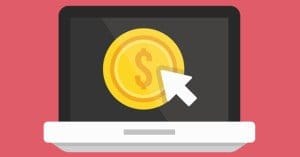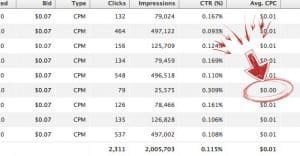The Difference Between Website Impressions and Clicks

In website marketing, the terms impression and click come up time and again. They’re both means of measuring one thing: the effectiveness of your advertising. What’s the difference, and which is better?
Impressions
Impressions are the most basic, utterly mundane interaction you can have with a page. In fact, it’s hardly even an interaction. An impression is a view. When your ad loads and displays in front of a user, that is one impression.
What’s the point of impressions? Well, you can’t have clicks without impressions. Users need to see your ads before they can decide whether or not to click them.
This is typically referred to as CPM, or Cost Per Mille, where Mille means thousand. So if you’re paying for $1.50 CPM, $1.50 will earn you 1,000 impressions on your ads. One thousand people will see your ads, and all you had to do was pay under two dollars.
Fun fact: mille is Latin for “thousand” and is the root of the word millennium.
Some advertisers will pay you for a certain number of impressions. This works the opposite way; you pull in views, and the advertiser will pay you per thousand, typically in the sub-$1 range. This is because it’s incredibly easy to get views, but it’s hard to get anything out of them.
Clicks
Now for clicks. A click, simply enough, is whenever a user actually clicks on your ads. This is a bit more involved, however.
Like CPM, CPC – Cost Per Click – goes both ways. You can pay for X number of clicks on your site, or you can run advertising that pays you for every X number of clicks. Either way, the click is the basic unit of measurement.
There’s a bit of filtering going on behind the scenes, however. Imagine if you were paying $3 for 1,000 clicks. A competitor decides they want to drain your budget, so they sit on your website and click your ad repeatedly, over and over, thousands of times. This would, normally, drain your account. With filtering, however, those only count as a single unique click.
Clicks are much, much more important than impressions, for one reason. Think about how you need an impression in order to get a click. Likewise, you need a click in order to get a conversion.
Well, that’s not strictly true. People can find your website through other means and convert directly, without ever seeing your ad. However, all clicks have the potential to lead to conversions, which is what makes them so important.
For ads that pay by the click, you can also consider affiliate ads. Affiliates pay you by the click, but they also put a little bit of tracking code on the session of the user who clicked, and track whether that user goes on to convert. If they do, you earn a higher payout.
Facebook Relevance
Clicks and impressions are the essential currency of ads in most places, but Facebook throws a curveball into the mix with OCPM.
OCPM is Optimized Cost per Mille, which is identical to CPM – paying for impressions, remember – only it takes advantage of Facebook being, well, Facebook. Rather than blindly dumping your budget into the first thousand people who see your ad, Facebook tries to be a bit more intelligent about spending your pennies, finding people who are most likely to actually click your ads, even though you’re paying by the impression, not the click.
So is CPM or OCPM more effective? Some people assume that OCPM is worse, because it removes control from your campaign and forces you to put trust in Facebook, hoping they know best where to spend your pennies. Others take the time to test, to come up with interesting results. In this case, Jon has found that OCPM is miles above plain CPM in terms of conversion rates. The question becomes a competition between OCPM and CPC, or rather, CPA – Cost Per Action. Facebook allows various actions, rather than just ad clicks, to be the trigger point for costing you money. These include conversions and page likes.
Of course, on Facebook, it’s all about the money. Plain, regular old CPM is going to be extremely cheap, but also the least effective option by far. OCPM is going to be much more expensive, but much more effective. CPC and CPA will be still more expensive, but potentially even more effective, though at that point it comes down to your targeting.
DIY Optimization
On any platform other than Facebook, you’re going to have to choose between the cheap, ineffective CPM and the effective but tricky CPC. The choice should be clear; CPC is the winner, as long as you do it right. You have the potential to dump a huge budget into CPC with no returns, but it’s not hard to optimize your ads to maximize your CPC returns.
- Start with broad targeting and narrow down over time. If you start with 100 keywords to target, you can find the 10 best. If you start with 10, you might only find one or two effective keywords.
- Make use of geographic components in your ads, keeping in mind various traits of the location, such as climate and local events.
- Test different placements for different ads, to see if one will work better than another.
- Don’t abandon keywords just because they don’t work right away; they might have seasonal fluctuations or simply be out of style for the moment.
- Make use of negative keywords whenever possible, to eliminate the possibility of showing your ad for queries involving your keyword but unrelated to your product.
- Test different copy and, when relevant, images. You can run a number of variations at a time; you’re not limited to just two.
- Pay attention to your quality score, when using Google CPC. This will affect your bid and the placement of your ads.
- Learn when it’s time to stop testing and start investing in your best performers whole-hog.
There’s a lot you can do to optimize your ads, but a lot of it just comes down to testing, experimentation, iteration and repetition.
 ContentPowered.com
ContentPowered.com





Thank you, answered my question.
You’re welcome, James!
Thank you!
You’re welcome, glad my article helped =]
I am looking for difference as my google analytics show higher impression rather than few clicks. This article give idea that what is difference between impression and click
I still don’t understand the difference. Everyone keeps saying an impression is a view, but how do you view anything w/out first clicking on something to view it? What does it mean to view an ad before clicking on it ?
you are the one who explained me the difference thank youuu
Hey, can you please tell me. If the user does not click on ad and i’ve got 1000 impressions, then AdSense will pay me or not? i mean, do i get money just for impressions?
This was very informative. You just broke it down in an easy to understand way. Thank you!